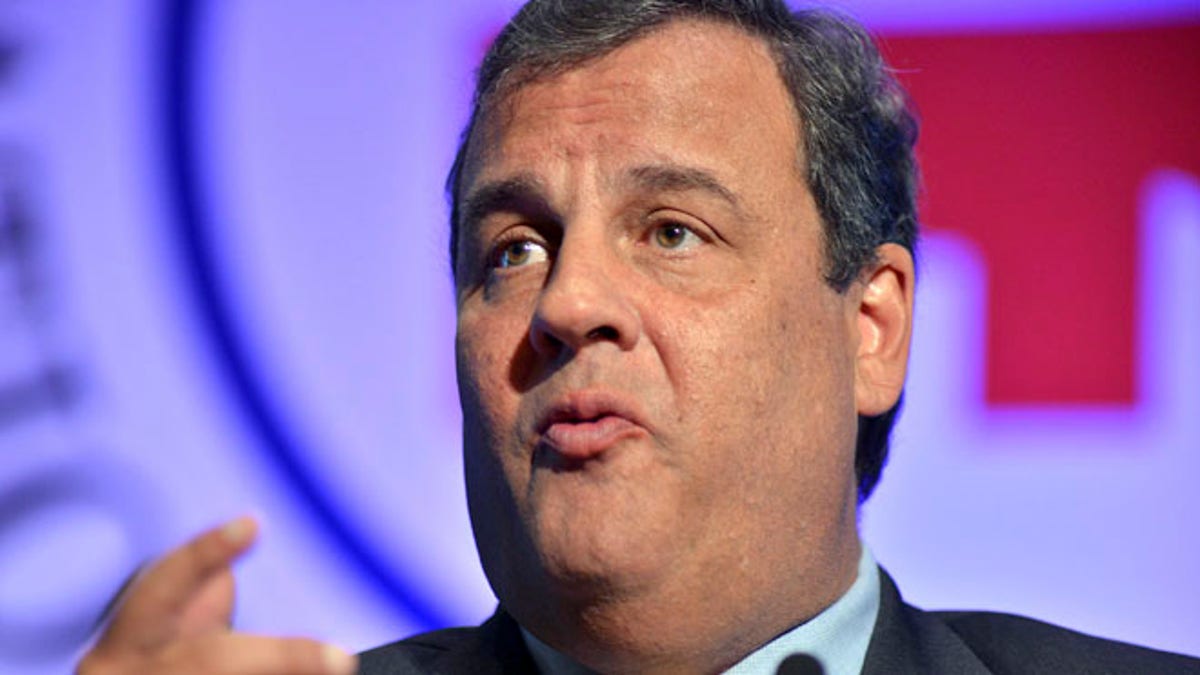
Aug 15, 2013: New Jersey Gov. Chris Christie speaks to fellow Republicans during the Republican National Committee summer meeting in Boston.
TRENTON, N.J. – New Jersey Gov. Chris Christie agreed Friday to give chronically ill children easier access to medical marijuana, but he was unwilling to go as far as state lawmakers wanted.
The Republican governor conditionally vetoed a bill on the topic, saying in the document, "Parents, and not government regulators, are best suited to decide how to care for their children."
He said he agreed with provisions that would allow production of ingestible forms of pot at state-approved dispensaries and to allow dispensaries to grow more than three strains of the drug. But he struck a part of the bill that would have dropped a requirement that a psychiatrist and pediatrician sign off before children are allowed medical marijuana. He said he wanted to keep in some safeguards for young patients.
The bill now goes back to the Legislature. If lawmakers make the changes Christie requested, it will become law. It was not immediately clear when lawmakers may take it up, but the state Senate does have a voting session scheduled for Monday.
Sen. Nick Scutari, one of the sponsors of the bill, said he's pleased that children would be given access to edible marijuana in strains appropriate for their medical needs, but concerned that psychiatric review is an unnecessary hurdle for parents. He said he will review the conditional veto before discussing with fellow lawmakers how to proceed.
Like the 19 other states that allow medical marijuana, New Jersey lets children use it. But unlike all but a few, the state law and regulations currently in place — considered perhaps the most stringent among states that allow medical pot at all — have additional hurdles for young patients.
They must have a pediatrician and psychiatrist sign off on their use. And if one of those doctors is not registered with the state medicinal cannabis program, they would need a third physician to recommend the drug.
The bill to ease access sparked a new round of debate between Christie and medical marijuana advocates, many of whom doubt that he wants the state's fledgling pot-for-patients program to succeed.
It attracted broader attention this week when parent Brian Wilson confronted the governor during a campaign stop in a diner. Wilson believes his 2-year-old daughter, Vivian, would benefit by using a certain form and strain of pot for Dravet syndrome, a rare and sometimes deadly form of epilepsy.
In a moment captured on video that made news shows and websites, Wilson told the governor, "Please don't let my daughter die."
Christie, who has raised concerns that it could be adults using pot recommended for their children, told him, "I know you think it's simple, but it's not," during their brief exchange.
Wilson and his wife, Meghan, who live in Scotch Plains, said in a statement Friday that they are disappointed Christie "decided to make it so difficult for parents, who are already enduring tremendous pain and heartache, to get approval for such a safe and simple medication."
They said it's not fair that other drugs can be prescribed for children without additional doctors signing off.
The changes Christie is willing to make could enable children like Vivian to get the form and strain of pot that could help them by lifting limits on how many strains of marijuana dispensaries can grow and by allowing ingestible forms that kids could take without smoking.
Currently, New Jersey allows dispensaries to grown only three strains of pot, and that has made it unlikely that the kind Vivian's family says she needs will be made available. Brian Wilson said other children with Dravet have benefited from a form high in a compound known as CBD and low in THC, the chemical that gets pot users high. Wilson said the drug can work not only to relieve pain or build up an appetite — two things medical pot is often used for — but as a medicine to treat Dravet.
New Hampshire, Delaware and Illinois have multiple-doctor requirements for kids to get pot, said Chris Goldstein, a marijuana activist who is on the board of the Coalition for Medical Marijuana of New Jersey. "This is something that originated in New Jersey and is likely to be copied in other states," he said.
Roseanne Scotti, New Jersey director of the Drug Policy Alliance, said lifting the limit on how many strains of marijuana plants New Jersey growers can produce will be helpful for other patients because it will allow "real innovation and better options." Medical marijuana activists say different types of the drug work for different conditions and patients.
New Jersey now has just one operating legal dispensary with a second expected to open in September.
